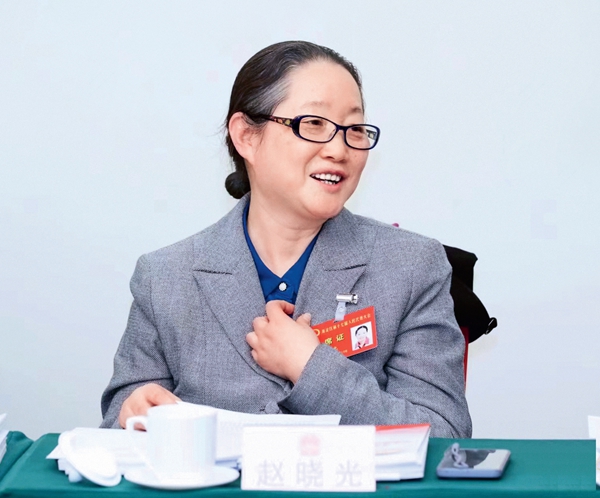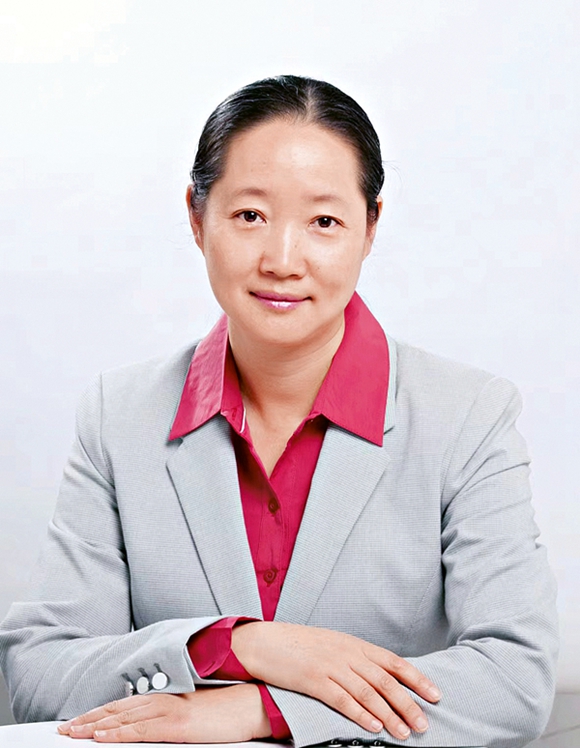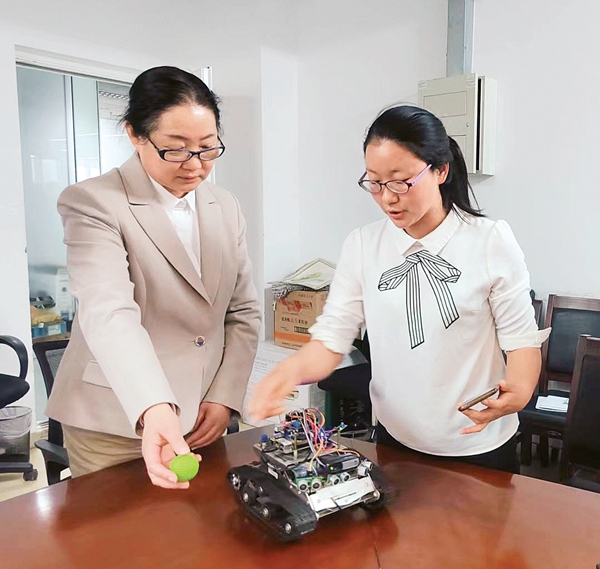Accelerating AI Integration with Advantageous Industries

Zhao Xiaoguang, a member of the National Committee of the Chinese People's Political Consultative Conference and a researcher with the Institute of Automation, under CAS, has contributed wisdom and strength to the development of intelligent robot technology in China.
She has presided over and participated in more than 20 national-level projects, and she has achieved fruitful research results in intelligent robot control, autonomous robot navigation and service robot system guided by language and visual information.
Original Aspirations
"As a child, I wasn't drawn to games like jumping rope or playing house. Instead, I found myself captivated by the process of dismantling semiconductor radios alongside my elder brother. Even when we couldn't reassemble them, our parents never scolded us; instead, they patiently explained how the radios functioned," Zhao recalls.
Growing up in such a family environment nurtured her curiosity, and gave her the confidence to hone her problem-solving skills.
By the time she reached adolescence, she had become quite adept at fixing everyday appliances, like electric cookers. When it came time to choose her major at university, Zhao opted for automation. She also looked forward to exploring the wider world.
"When I visited Shenyang Institute of Automation, under CAS, at 16, I was amazed by the underwater robots," Zhao recalls. Determined to delve deeper into the field of robotics, she became a researcher with the institute after she finished her postgraduate studies. She also completed her doctoral studies while working there.

Exploration
"During my six years at Shenyang Institute of Automation, I immersed myself in the study of underwater robotics," Zhao says. At that time, she kept thinking about the possibilities that would result if robots could see. She developed an interest in computer vision.
After she obtained her Ph.D., in 2002, she moved to Beijing to join a postdoctoral research program at the Institute of Automation, under CAS. Upon completion of the postdoctoral program, in 2004, she began working at the institute, where she dedicated herself wholeheartedly to the field of robotics.
During the past three decades, Zhao has remained steadfast in her commitment to scientific research, and to the application of intelligent robotics. She has also translated her research results into practical applications.
During the 2022 Winter Olympics, in Beijing, Zhao's team unveiled its innovative invention: An intelligent disinfection robot, designed to conduct deep, ultraviolet disinfection at Beijing National Stadium. With a high level of autonomy and perception, the robot was able to accurately differentiate between human and non-human entities, autonomously make decisions, plan disinfection cycles, and execute tasks independently.
"Unlike ordinary disinfection robots, our intelligent robot can recognize the shapes of complex objects, and it can autonomously plan disinfection paths. Efficient and precise, they are ideal for unmanned disinfection," Zhao says.
The team's innovation was made possible by advancements in ultraviolet chip technology, multi-degree-of-freedom robotic arm technology, binocular visual recognition, and intelligent control technology, Zhao adds.
"Our nation has made significant strides in scientific and technological innovation," Zhao says, proudly. Specifically noting the evolution of robotic arms, she adds, "During the 1980s, we developed simple robotic arms. In the recent decade, our industrial robots have developed rapidly. Today, we lead in six-degree-of-freedom robotic arms, with controllers and sensors all made in China. Robots have been used in various fields."
Zhao emphasizes the importance of implementing technology to yield tangible results, and to adopt various avenues for technology translation. "Some involve commercializing complete products, while others entail serving businesses through technological upgrades, or solving critical technical issues. We primarily focus on the latter."
She cites a cement plant as an example. Through collaboration with research institutes, the plant shifted from manual, labor-intensive processes to automated production and informatized management.
"This transition has liberated workers from strenuous tasks and enabled them to seek more suitable roles," Zhao says. "Moreover, robotic operation is safer, and efficiency and quality are guaranteed, because of the consistent parameter control."
Zhao says she hopes entrepreneurs in the basic manufacturing industry will understand the development trend of advanced technology, and the direction of future progress. "By proactively digitizing and informatizing industrial enterprises, intelligence will naturally follow. For enterprises lagging behind in digitization, we must aid them in catching up," she stresses.

Innovation and the Future
Innovation and the advancement of technology will always require young minds. Zhao holds her team's younger members in high regard. She praises them for their vibrant and avant-garde thinking. The team has meetings every two weeks, during which the members brainstorm and address challenges.
Zhao views challenges as part of the team's research. "It is normal to meet challenges when doing research. Solving a problem means one less hurdle to clear. A well-devised plan can guide us away from detours and boost willpower," Zhao says.
"In the domain of artificial intelligence (AI) and robotics, we must strive for outcomes that are both groundbreaking and innovative," Zhao adds. Her team's work has focused on combining AI technology with advantageous industries, particularly the advanced manufacturing industry.
Zhao and her team are currently exploring new frontiers, especially in the convergence of medical engineering and robotics, and their planned next step is to realize robotic assistance in hospital's intensive-care units.
Zhao is full of confidence when she talks about the future applications direction of artificial intelligence. "I look forward to the rapid application of AI technology in various industries, such as medical care, education and home-based care services for the elderly and people with disabilities. I believe AI can empower more industries, thus making us more productive and freeing up our time to do more of the creative work we are better at."
Photos from Interviewee
(Women of China English Monthly May 2024)
Editor: Wang Shasha
Please understand that womenofchina.cn,a non-profit, information-communication website, cannot reach every writer before using articles and images. For copyright issues, please contact us by emailing: website@womenofchina.cn. The articles published and opinions expressed on this website represent the opinions of writers and are not necessarily shared by womenofchina.cn.

 京公网安备 11010102004314号
京公网安备 11010102004314号